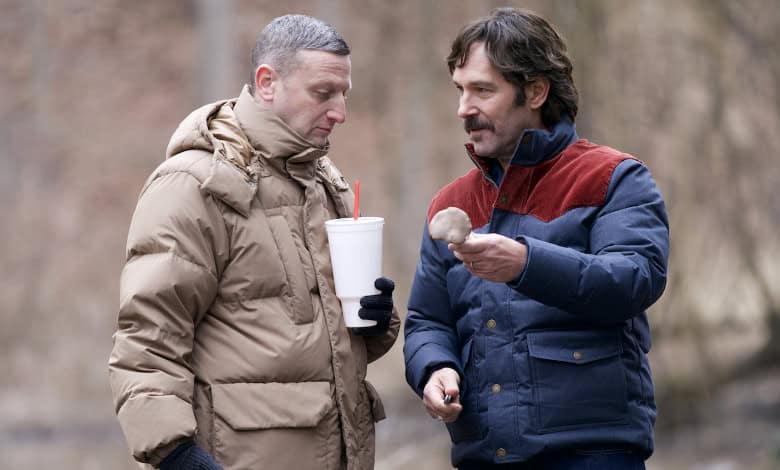
“Detroiters” alum Tim Robinson is an acquired taste. If that doesn’t describe you, “Friendship” may be the biggest endurance test since “The Surfer.”
Robinson’s big-screen closeup follows a misfit who thinks he’s found a new best friend. When that bond crumbles, he responds … poorly. Except the film isn’t invested in its own story.
That’s just one of the problems plaguing this cringe masterpiece. That’s not a compliment.
Robinson stars as Craig Waterman, a socially awkward soul who somehow has a beautiful, well-adjusted wife (Kate Mara) and teen son (Jack Dylan Grazer). Already, we greet the story with arms folded against our chest.
This doesn’t make sense. Just wait.
Craig’s humdrum life perks up when he meets Austin (Paul Rudd, great in a thankless role). The charismatic neighbor invites Craig on a local adventure, and the two bond along the way.
Craig is smitten. Austin even plays in a rock band! (Rudd isn’t ‘slappin’ da bass,’ alas)
Except Craig lacks the emotional maturity to sustain a friendship, to put it mildly. Austin cuts Craig off after one brutal attempt to incorporate him into his friend group.
A stunned Craig can’t process the separation. Yet writer/director Andrew DeYoung isn’t interested in seeing that premise through. “Friendship” exists to let Robinson revel in his meltdown brand of humor.
He gets plenty of opportunities to do just that.
Craig can’t connect with his co-workers, says inappropriate things around his boss and fumbles basic social interactions. It’s not presented as being on the spectrum or suffering from emotional trauma.
It’s Robinson’s shtick. Your mileage will absolutely vary.
View this post on Instagram
One scene late in the movie hints at something profound, a chance to reveal why adult male friendships can be so tricky to navigate. Have we misjudged Craig all along?
The moment ends with violence, suggesting DeYoung cares about nothing except the next Robinson outburst.
“Friendship” circles material far better handled in the funnier, more insightful “I Love You, Man” (also starring Rudd). Adult men often struggle to form friendships, a problem that grows with age.
DeYoung’s screenplay acknowledges that truth without adding much to the cultural conversation. The film lacks anything resembling wisdom, leaving characters to respond to Craig’s outbursts.
The laughs are sporadic and awkward, fueled by Craig’s inability to function in adult settings. How did he woo Mara’s character? How is he still employed?
Rudd’s character starts strong but often makes little sense. He’s a talented TV personality with a wife and interesting hobbies. Why would he rush to bond with Craig in the first place?
A smarter screenplay would tease something bold and unexpected. Perhaps the two have more in common that we expect?
The premise suggests an escalating series of events capturing Craig’s desperate attempts to reconnect with Austin. Even that potential theme is tossed aside in favor of strained plot threads, like a key character’s disappearance.
A running gag regarding Austin’s TV-worthy image merits a chuckle, but it feels as desperate as a fart joke.
“Friendship” isn’t cookie-cutter by any measure, and its willingness to make us squirm feels important at the moment. It’s brave to defy convention in 2025.
That’s the best selling point for a movie that can’t offer more than that.
HiT or Miss: “Friendship” promises an uncompromising take on male bonding. Instead, we’re left with a comedy we can’t wait to end.
